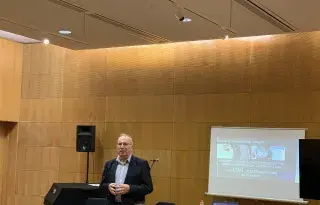BA (Hons) in Audio Development
Search to find a different course
Please note: There will be no intake for this course in September 2025.
Course Overview
This course provides students with a holistic education, covering technical, creative, and theoretical aspects of digital audio work. Students develop strong technical skills, exploring areas like audio signal processing, synthesis, sound design, and music information retrieval, while also gaining proficiency in programming languages like C++, Python, and JavaScript.
The curriculum focuses on Digital Signal Processing (DSP), where students build a solid foundation and apply DSP principles to create various audio effects. Integration of audio in multimedia frameworks, including video and interactive media, prepares students for diverse applications. The course encompasses music technology, encouraging the creation of virtual instruments, music software, and electronic music. Acoustic principles are integrated, allowing students to optimize recording environments and address acoustic challenges. Real-time systems, human-computer interaction principles, and ethical considerations in audio production are emphasized.
Research and innovation are integral, fostering exploration and contribution to advancements in audio computing. Aligned with industry trends, this course ensures graduates are well-prepared for careers in audio engineering, sound design, and software development. Practical experiences and hands-on projects cultivate creativity and problem-solving skills, enabling graduates to enter the dynamic audio technology industry with a comprehensive knowledge base and technical proficiency.
What makes this course different
This programme meets the requirements of the Teaching Council for second-level school teaching.
This course provides the opportunity to develop and advance a broad range of musical skills and interests, all within a collaborative and creative environment, with many opportunities to perform.
88% of graduates are in employment or further study after 6 months of graduating.
Understanding the Industry
Almost every aspect of Musical activity (including performance, composition, listening to music, music/audio storage and distribution) has been hugely impacted by advances in technology, primarily in the areas of software development, hardware, and networking.
This course has been developed in response to the growing industry demand for graduates with music and audio programming skills and a solid understanding of sound synthesis and audio processing techniques.
Career Opportunities
Future Careers:
- Audio and Music programming and software development
- Audio Plugin Creation
- Scripting
- Audio and Music archives and retrieval systems
- Audio and music solutions involving programming
- Web design and development (especially music/audio features)
- Synthesis
- Audio DSP Programming
- Project Development
Course Delivery and Modules
- Creative Collaborative Development
- Academic Writing and Research Skills
- Introduction to Musicianship
- Properties of Sound
- DAW and Mic Apps
- Creative Coding for Interactive Applications
- Musicianship for the Music Producer
- Recording Electric and Acoustic Instruments
- Sound Design Studies
- Algorithmic Composition
- Creative Coding for Audio Applications
- Sound and Music Representation
- Audio Signal Processing
- Mixing Fundamentals
- Media and Society
- Sound Design for Games
- Programming for Audio Applications 1
- Sound Synthesis
- Electronic Music Production
- Audio Implementation
- Audio Middleware
- Musical Data Analysis
- Programming for Audio Applications 2
- Advanced Audio Processing Techniques
- Audio Industries
- Work Placement
- Electroacoustic Composition: Composing with Sound
- Advanced DAW Techniques
- Music Research Skill
- Music and AI
- Production Sound for Media
- Physical Computing
- Sound for Immersive Technologies
- Production Libraries
- Major Project (2 semesters)
- Sound for Immersive Environments
- Culture, Society & Popular Music
- Preparation for Industry
- Entrepreneurship for Creative Industries
- Portfolio
Work placement
In Year 3 students undertake an industry work placement where they gain important contacts within the industry to help them in their future careers.
Fees and Funding
Please find information on fees and funding here: www.dkit.ie/fees
Entry requirements
Standard entry requirements apply. There are no special entry requirements for this course.
Ask us a Question
If you have a question about the BA (Hons) in Audio Development please ask it below and we will get back to you.
Disclaimer: All module titles are subject to change and for indicative purposes only. All courses are delivered subject to demand and timetables are subject to change. Elective Module options will only run subject to student numbers. The relevant Department will determine the viability of each elective module option proceeding depending on the number of students who choose that option. Students will be offered alternative elective modules on their programme should their preferred elective option not be proceeding. Award Options for Common Entry Programmes: The relevant Department will determine the viability of each award option proceeding depending on the number of students who choose either option. If the numbers for one of the Award options exceed available places, students for this option will be selected based on Academic Merit (highest grades).

